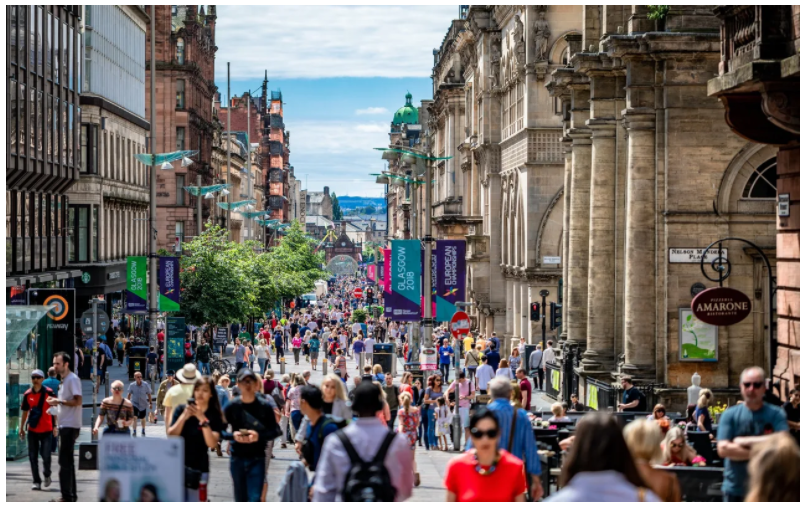News
Tom Hatfield has been speaking with React News discussing why we can expect to see a post-lockdown leisure lift.

Life during lockdown has wreaked havoc on the retail and leisure markets with the majority of non-essential retailers and practically every leisure operator having to close.
The retail sector had already been in a state of flux as the high street has been under pressure to meet the changing demands of today’s consumer. Given the success of online-only retailers, physical stores – and their associated costs – have often been seen as part of the problem when explaining the decline of the high street.
But what does this mean for retailers now lockdown restrictions are starting to ease? Will bricks-and-mortar shops become obsolete? In-store spending may have plummeted in the short term but we are, in reality, likely to see a sharp increase in footfall to stores and that too in the leisure sector, resuscitating these sub-sectors.
In fact, despite seeing a surge in sales online, several online retailers have recognised the need for store presence and already launched physical stores, with Amazon Go opening in the UK last year, as part of a year-long pilot programme. Similarly, Made.com – once an online-only retailer – changed tack, opening numerous stores and showrooms. These retailers have woken up to the fact that, though buying online is convenient and low cost, a website cannot offer consumers the same experience as a physical shop, where shoppers can see products in the flesh, touch them, try them out and speak to sales experts face-to-face.
Indeed, a study by technology support provider, Vista Retail Support, found that 81% of UK consumers see physical stores as crucial to the shopping experience, with 70% of those surveyed preferring the full experience of physically browsing items to looking online. So, though online has its merits, shopping as an activity still holds appeal for consumers, and post lockdown, this is about to increase.
In addition, a study by market researchers, GFK, found that 59% of 20 to 29-year-olds and 57% of 30 to 39-year-olds agreed that experiences are more important than possessions. Meanwhile, one of the key learnings from The Future Laboratory’s consumer trends reports was that shoppers seek out a sense of community – something they cannot access via online-only stores. As consumer demand shifts, retailers can no longer compete on price and product alone: increasingly, shoppers are looking for engaging, social experiences that cannot be bought online or found at home.
Although technology has managed to create some cultural experiences online, the emerging ‘retailtainment’ market is something technology cannot fully recreate. Prior to the lockdown, tenants at retail and leisure parks had already started to diversify by adding a range of alternate uses to include trampolining, climbing walls, mini golf, ninja warrior courses and gamification within their existing units, to continue to draw back and attract new customers.
Once we are allowed to move freely, shop and socialise, savvy retailers will have to continue to look to incorporate more aspects of the leisure market into their offering to preserve their appeal. From events at Waterstones, to Tiffany and Co’s Style Studio, or the IKEA café, retailers will have to further develop creative ways to make shopping into a memorable experience.
Leisure and retail parks are perhaps best placed to leverage this trend and why we anticipate maximum footfall here. These larger venues can provide consumers with multiple opportunities for positive face-to-face interactions and an ever-evolving leisure offering – something we are all craving after months at home. Food and beverage outlets, cinemas, gyms, events and pop-ups can help turn retail assets into dynamic destinations – and all with the added benefit of free parking.
The growing consumer emphasis on experience is what first drew us, in 2016, to invest in Birmingham’s Star City, a family leisure and entertainment complex that is the largest regional scheme of its kind in the UK. Since ownership we have signed deals with Costa Coffee, Dominos, Tenpin Bowling, and Vue Cinemas.
In addition to this, social media has become more important than ever to engage with existing customers. During lockdown many leisure operators such as boutique gym operators have been offering free online workouts to keep existing members engaged and attract new members once lockdown is over.
The landscape of retail and leisure is evolving, now more than ever. In today’s challenging market, the operators that survive are those that adjust to changing consumer demands, transitioning from a one-dimensional, transaction-based offering to one designed to offer consumers a varied experience, combined with a sense of community.
Far from spelling the end for physical stores, the convergence of retail and leisure is driving their increased popularity, and post lockdown, we will see retailers and leisure operators competing to be at the helm of retailtainment and get the nation enjoying experiences again.